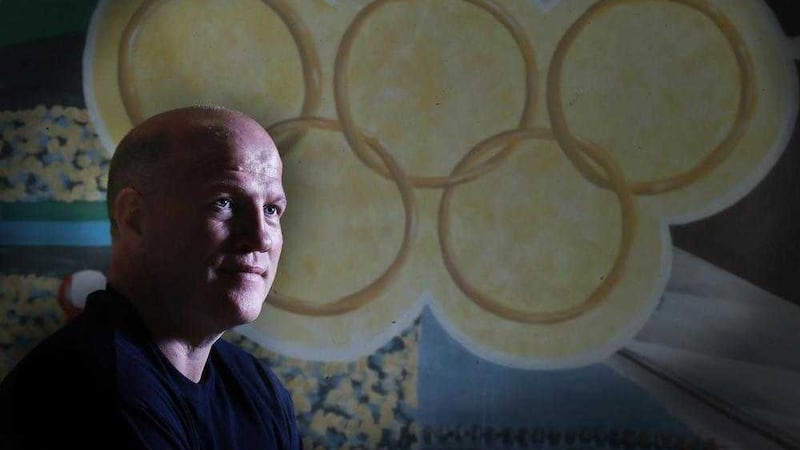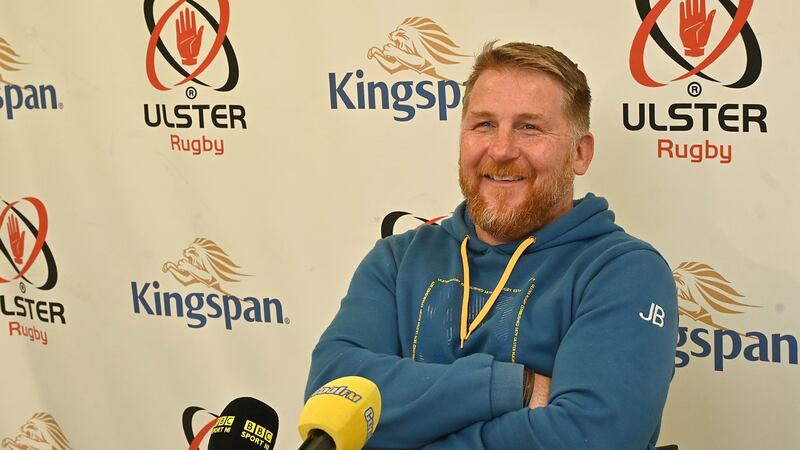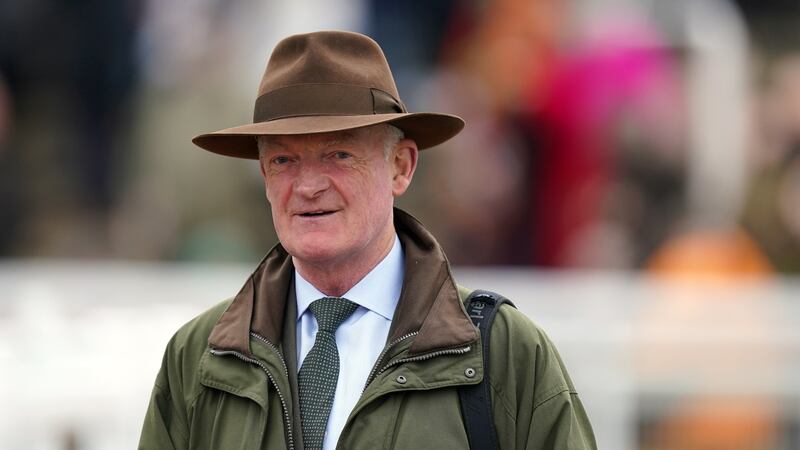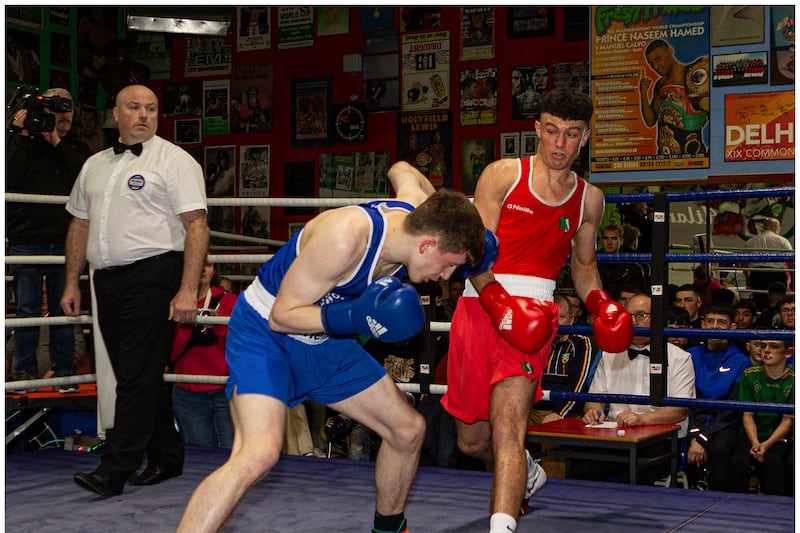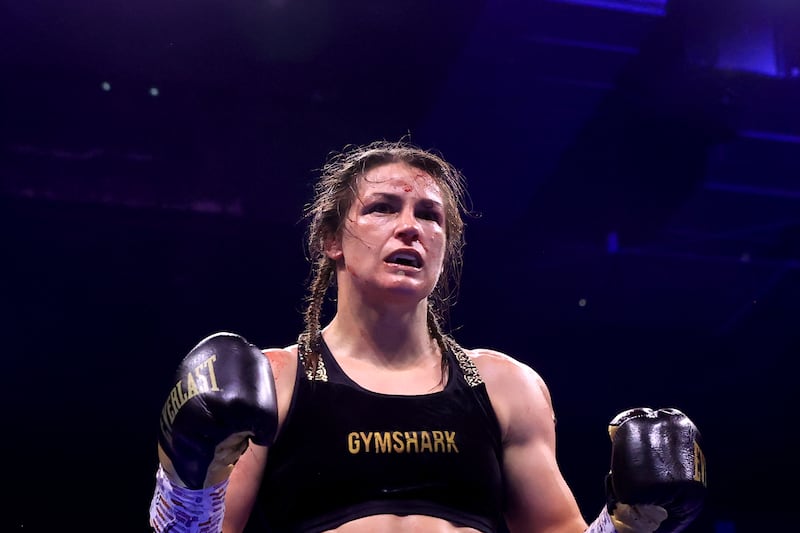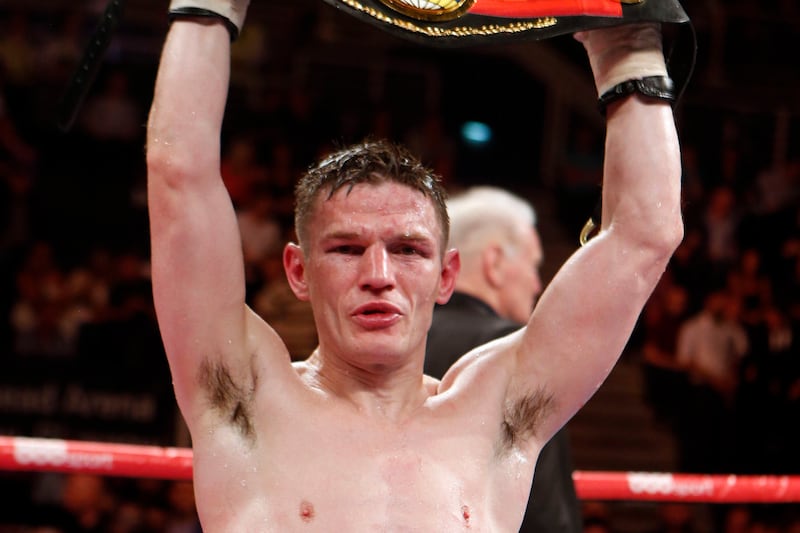Boom, boom, boom IRELAND... Boom, boom, boom IRELAND...
We’re just waiting on a decision now...
Boom, boom, boom IRELAND... Boom, boom, boom IRELAND...
Michael Carruth is champion of the Olympic Games! Michael Carruth is the champion, the champion, the champion...
IT’S the most famous jump in Irish sporting history. Never mind Arkle leaping the last at Cheltenham to win his first Gold Cup, or Packie Bonner hopping with delight after denying Daniel Timofte at Italia ’90, the image of Michael Carruth taking to the skies at the Barcelona Olympics in 1992 trumps them all.
It wasn’t even meant to happen.
In those quiet moments when he allowed his imagination to run wild, Carruth had envisaged going down on one knee and blessing himself, just as Ronnie Delany had done when becoming Ireland’s first Olympic gold medallist at the Melbourne Games in 1956.
Instead, adrenaline and instinct kicked in. When his name was called out at the old Pavelló Club after a war of attrition with Juan Hernandez Sierra, the Cuban star they said couldn’t be beaten, Carruth sprung higher than the top rope.
Michael Carruth is champion of the Olympic Games! Michael Carruth is the champion, the champion, the champion...
When legendary commentator Jimmy Magee uttered those words, it was the first time an Irishman had won a gold medal for boxing at the greatest show on earth. Twenty four summers on, it remains the only time an Irish male has topped the podium.
Nobody wants that to change more than Carruth. He is proud of his place in Irish sporting lore, but it’s time for others to take up the baton.
As the Irish team apply the finishing touches to their preparation for the 31st Olympic Games in Rio de Janeiro, which get under way next Friday, gold medal hopes rest primarily on the shoulders of Belfast boys Paddy Barnes and Michael Conlan.
Carruth agrees with the consensus but, having seen so many try and fail, advises caution.
“Michael’s dad John is from Drimnagh, he would’ve been coached by my dad and boxed out of here, so we believe Michael is a product of Drimnagh, not just Belfast,” said the Dubliner.
“Without question he’s our golden boy at the minute. He’ll medal, I’m not going to say he’ll take the gold. I hope he does and I hope Paddy does as well.
“I became the first Olympic boxing champion from Ireland, and I don’t want to be the last.
"Paddy and Michael need to stop saying they’re going to win an Olympic gold medal – they need to just do it, because they’re putting themselves under pressure.
“I didn’t say I was going to win a gold medal; I went and won the gold medal.”
The first part of that last statement isn’t strictly true. Carruth did say he was going to win a gold medal - not to the public through television cameras or newspapers, but to someone much more important.
Seventeen years before Barcelona, as an eight-year-old, Carruth laced up gloves and traded leather for the first time at a show in Greenhills Boxing Club. On the same night, he made a promise to his father Austin.
I will be an Olympic champion one day and when I am, it’ll be for you.
Seoul 1988. The first chance, the last chance? It could have been both. A big noise in boxing circles back home Carruth, at 21, was one of the leading lights on a team packed with talent.
But even before they even travelled to South Korea, the omens weren’t good. A training camp at a former ballroom in the county Kerry village of Castlecove didn’t exactly capture the imagination.
“All the better boxers at the time were in Dublin and Belfast, so we didn’t know what we were doing in Kerry,” recalls Carruth.
“We were a little bit under-prepared.”
For Carruth, though, it wasn’t the remote location and lack of quality sparring that would prove his undoing – it was boiling himself down to the 60 kilogram lightweight limit.
When you consider he had gone up two weight classes by the time the Barcelona Games came around four years later, it isn’t hard to form a picture of the struggle Carruth faced.
As it was, in the third round round he faced Sweden’s George Cramme, a man to whom he had “handed his arse” at a multi-nations tournament in Copenhagen the previous year.
A left hook caught him flush on the chin and those days and weeks of cutting weight finally took a toll. He got back to his feet, but the referee had seen enough.
“I walked onto a sledgehammer and my resistance was gone - that was it.”
As an army corporal, the Drimnagh man was used to facing down adversity, to digging deep when the going got tough, but this was something different.
Forget the personal and collective disappointment as the team returned empty-handed, for Carruth the hurt went much deeper. It went back to Greenhills, eight years old, first fight, and a promise as yet unfulfilled.
Friend, team-mate, weekend house guest, Billy Walsh was affectionately known as “the seventh son” in the Carruth household. In the year prior to the Barcelona Games, the term sworn enemy was added to that list.
Three years after sharing a room in Seoul, Carruth and Walsh found themselves in the centre of a three-fight saga surrounding the welterweight position on the Irish team heading to Barcelona.
Walsh won the first, in the opening round of the 1991 Irish senior championships, though Carruth still vehemently disputes that decision. Regardless, the Wexford man was in pole position, leaving Carruth to hope for the best.
“I had the voodoo doll out manys a time,” says the Dubliner with a wry smile.
If he did, it paid off as Walsh failed to nail down a place. However, a broken hand left Carruth in a race against time ahead of the Irish seniors at the start of 1992.
“I got the plaster off two days before Christmas - me and Paul Griffin were in here training on Christmas Eve, St Stephen’s Day and right the way through after Christmas.”
Knowing he was likely to come up against Walsh again, and that losing was not an option this time around, Carruth enlisted the help of psychologist Felicity Heathcote.
“She had me doing some whacky things. Breathing methods, visualisation. I envisaged doing thousands of rounds of sparring when I was resting, against a faceless opponent.
“I didn’t actually spar a single round before the first fight in the championships on the 10th of January.”
Carruth and Walsh progressed through their respective sides of the draw to meet, inevitably, in the final. This time Carruth tied it up at one win each, his destiny was now in his own hands – or so he thought.
Walsh walked away from the sport, got back to playing hurling, socialising, enjoying life, only to be thrown a lifeline by the Irish Amateur Boxing Association when a box-off was ordered between the same two men on Valentine’s Day.
Carruth was astonished but, knowing Walsh would struggle to get down to the welterweight limit following his self-imposed exile, he and his father devised a plan.
“Aussie told me to go out and fight him like a dog because he thinks you’re going to box him. I did in the first and second, I fought him like a dog, took it all away from him.
“In the third I boxed him, I was so far ahead, and towards the end I hit him a smack and he was gone...”
Seeing his friend turned foe out on his feet and there for the taking, Carruth made a conscious decision to temporarily abandon his fighting instinct.
“My brothers were roaring me on but we got in a clinch and I said ‘Billy, hold on to me’. He had nothing left, but I didn’t want to knock him out. He said ‘I won’t throw anything if you don’t’, so for the last 20 seconds or so, neither of us threw a punch.
“When I got back to the corner my da gave me a smack across the face and said ‘don’t you ever do that again’.”
When Carruth and fiancée Paula sat down weeks later to draw up a guest list for their wedding, the name of Billy Walsh was the first noted down.
He attended, no questions asked.
“DA, you know that bottle of Champagne in the fridge? I think you should open it.” Michael Carruth can still hear his father’s voice on the other end of the line.
For the Seoul Olympics, he was picked. Barcelona was a different story – Carruth had made his own way. After the Billy Walsh saga, he still had to negotiate the final qualifier in San Pellegrino, Italy.
Granted a second chance following a quarter-final defeat to Polish boxer Wieslaw Malyszko, a few choice words from coach Mickey Hawkins – “my lucky charm” - and team-mates Joe Lowe and Neil Gough, both of whom had seen their Olympic dream grind to a halt, was all the inspiration he needed.
Carruth battered Frenchman Said Bennajem in the final, and phoning home with the good news was the moment he had longed for.
Little did he know the pride his father felt would come full circle just three weeks later when Austin Carruth informed his son that he too was headed for Barcelona after being selected as a coach alongside Cuban Nicolas Cruz Hernandez.
It couldn’t have been more perfect.
The Olympic win (and jump):
A training camp in the formerly communist East German city of Cottbus made Castlecove four years previous seem like a holiday camp. With the same grim cuisine on offer each day, no TV, no games room, one toilet and one shower between 10, it was a test of each man’s resolve.
Bantamweight hope Wayne McCullough broke, leaving for home at the start of July with the Olympics just weeks away.
“Grumpy little git,” smiles Carruth.
“I’ll tell you why he came home – because it was his birthday. His birthday was on the seventh of July, mine was on the ninth. He left, I stayed.
“I got what I wanted out of Cottbus. I was an army lad so maybe I was a little bit tougher than the others.”
To this day Carruth chides McCullough that, had he stayed, it would have been the Belfast man who became the first Irish boxer to win gold at the Olympic Games. The truth is that one may never have hit the heights attained that summer without the other driving them on.
McCullough wasn’t the only one pushing Carruth either. Dad Austin, living in fear of a repeat of Seoul, would wake his son in their shared room at 3am every morning to drink a pint of water.
“I was going to kill him - I was gonna bloody kill him.
“Aussie was my mentor and my tormentor at the same time, but he was right. Dehydration was his biggest fear because it cost me in my first Olympics – pre-hydration won me my second.”
Having breezed past Thailand’s Arkhoim Chenglai in the semi-final, only Hernandez Sierra stood between Carruth and the ultimate glory.
McCullough was in first though, also against a Cuban, Joel Casamayor. Having come through a war in his last four fight, during which he suffered a broken cheekbone, McCullough struggled and found himself well behind after two rounds.
Carruth was watching while getting his bandages done but had them cut off so he could go out and take in the third and final round from the tunnel. The sight of McCullough roaring back was all the inspiration he needed.
Although the Belfast man still fell short, his performance in those three minutes resonated with his team-mate.
“That showed me that they’re human, they’re like us. They bleed. They hurt.
“I was David, he was Goliath – he was supposed to slay me. All the pressure was on him.”
As a southpaw himself – albeit a right-handed one - Carruth always fancied his chances against lefties.
As he touched gloves with Hernandez Sierra, the sheer size of the task hit home. Standing 6”1, the Cuban was a full six inches taller.
“I remember thinking ‘sweet Jesus, the size of this fella. If I go to him he’s gonna kill me’. It was going to be a clash of who had the fastest right hook - and I did.”
Carruth took the first 4-3 but a public warning against the Dub in the second left it all square, 8-8, heading into the last.
“I had won the round boxing, without the public warning. I thought ‘come at me, come at me you bastard’, and he did.
“In the first minute of that round I became Olympic champion, because he walked on to three hooks – boom, boom, boom.”
In the corner, Austin Carruth was giving it the lasso with his index finger, telling his son to keep circling the ring. He did and, just before the bell rang, Carruth landed the last scoring punch of the fight.
“I knew I’d won, he knew he’d lost. I fell into my dad’s arms, and from there you’re just praying to God – don’t be a Roy Jones moment here, please.”
After an anxious wait, the verdict was announced – “the winner... in the red corner, Michael Carruth”. Olympic champion. The jump, the excitement. A beaming Austin was waiting in the corner.
“Thank you,” he said as the pair embraced.
“For what?”
“For keeping your promise.”
Back home, cameras caught Marty Morrissey being enveloped in a family crush at the Carruth household in Greenhills. There, in the middle of it all too, was Billy Walsh.
Nothing in the career, the life, of Michael Carruth – before or since – has ever come close to eclipsing that point in time.
“It’s a medal I’ve always wanted. To be honest, I’d have been happy with the bronze going over there.
“You couldn’t have asked for a better moment – my father was in the corner with me, my family were watching back in Ireland and I was part, and still am part, of the elite club.
“That elite is getting bigger and bigger, and it will get bigger in Rio again.”
